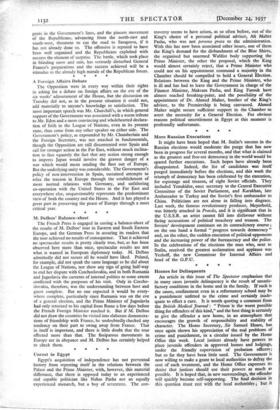A Foreign Affairs Debate The Opposition were in every way
within their rights in asking for a debate on foreign affairs, on the eve of the six weeks' adjournment of the House, but the discussion on Tuesday did not, as in the present situation it could not, add materially to anyone's knowledge or satisfaction. The most important speech was Mr. Churchill's, in which general support of the Government was associated with a warm tribute to Mr. Eden and a more convincing and wholehearted declara- tion of faith in the League of Nations, even in its present state, than came from any other speaker on either side. The Government's policy, as expounded by Mr. Chamberlain and the Foreign Secretary, was not attacked in fundamentals, though the Opposition are still discontented over Spain and call for stronger action in the Far East, without much inclina- tion to face squarely the fact that any action strong enough to impress Japan would involve the gravest danger of a war which would mean sending the fleet out of Europe. But the underlying unity was considerable. The Government's policy of non-intervention in Spain, sustained attempts to relax the tension in Europe through the establishment of more normal relations with Germany, and unfaltering co-operation with the United States in the Far East and everywhere else, unquestionably represents the predominant view of both the country and the House. And it has played a great part in preserving the peace of Europe through a most critical year.


































 Previous page
Previous page